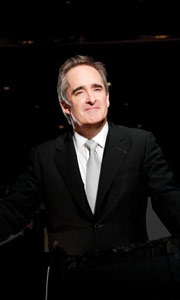By John Schauer
This Saturday is the annual Gala Benefit Evening hosted by Ravinia’s Women’s Board, which this year also incorporates Ravinia’s annual Tchaikovsky Spectacular, noteworthy to many for its performance of the beloved “1812” Overture with live cannon fire. But more spectacular to me is the music of Tchaikovsky in general, with or without artillery. Throughout my life, his name has always ranked in the top three of my favorite composers at any moment—often in rather incongruous company—and it’s quite possible, if push came to shove, that he would be my choice for my “desert island” composer.
What accounts for that? Of course, no one in the entire history of Western music ever surpassed his gift of melody, but it goes beyond that, beyond the sumptuous sound of his masterful orchestrations, beyond the vivid drama that seems to infuse every measure he ever composed. For me, his greatest quality is one that he shares with only a few other composers: the ability of a listener to derive full enjoyment of his music on a first hearing. Of course it isn’t just superficial gloss, and repeated listening will continue to yield new discoveries and insights, as my whole lifetime can attest. But he doesn’t pose the same obstacles as some composers whose music must be heard repeatedly before it even begins to feel comfortable and coherent. And in today’s time-restricted world where few people are going to take the effort to study and listen repeatedly to a piece they haven’t learned to love yet, it gives Tchaikovsky a head start in the favorite-composer sweepstakes.
I’m certainly not alone in loving Tchaikovsky’s music; in fact, the overwhelming popularity of his compositions has blinded those in some quarters to disdain his music. Certainly, they must reason, anything that appeals to that many people can’t possibly be really good. But, of course, they are dead wrong.
 In 2007 we asked James Conlon, music director of Ravinia’s CSO residency, what five composers he would recommend to someone approaching classical music as a novice. He didn’t hesitate in his reply: “I would certainly start anybody with Tchaikovsky. I would find something of Tchaikovsky, because of his genius of touching everybody’s heart—except for a few snobs, I guess.”
In 2007 we asked James Conlon, music director of Ravinia’s CSO residency, what five composers he would recommend to someone approaching classical music as a novice. He didn’t hesitate in his reply: “I would certainly start anybody with Tchaikovsky. I would find something of Tchaikovsky, because of his genius of touching everybody’s heart—except for a few snobs, I guess.”
I gleaned an insight to that appeal during my years as a graduate student of musicology when I accompanied a woman from the composition department of Princeton University to New York, where she needed to consult on a project with another composition student from Columbia University. After they accomplished what they needed to do, we retired to a small neighborhood pub in Greenwich Village to discuss music over a couple of beers. The discussion proved to be surprisingly volatile, evoking strong feelings from me and the Columbia student, to the point that others in the bar started listening in and adding their own two cents’ worth.
The crux of our disagreement centered on the role of structure in music. The Columbia dude felt it was far and away the most crucial element in determining the success of a composition. And while I was willing to concede its importance in a composer’s creative process, I argued vehemently that the vast majority of music listeners, outside of graduate composition students, do not consciously perceive the structure but rather derive enjoyment from the surface features of a piece, the presence or absence of soaring melodies, of comfortable harmonic turns, of the psychological drama generated by changes of texture, tempo, and key.
 But Mr. Columbia was equally adamant that musical enjoyment is generated first and foremost by structure, and just as it seemed our civil discourse was about to become a bar brawl, my Princeton companion offered an insight that has haunted me to this day. She pointed out that all of the musical examples her Columbia friend offered to bolster his argument were Germanic&mdsah;the music of Bach, Beethoven, and Brahms among them—while all of my examples lay outside the German tradition: Handel, Tchaikovsky, Berlioz. It made me understand suddenly why I am so moved by an aria by Bellini but bored by Brahms.
But Mr. Columbia was equally adamant that musical enjoyment is generated first and foremost by structure, and just as it seemed our civil discourse was about to become a bar brawl, my Princeton companion offered an insight that has haunted me to this day. She pointed out that all of the musical examples her Columbia friend offered to bolster his argument were Germanic&mdsah;the music of Bach, Beethoven, and Brahms among them—while all of my examples lay outside the German tradition: Handel, Tchaikovsky, Berlioz. It made me understand suddenly why I am so moved by an aria by Bellini but bored by Brahms.
There have been writers who have criticized the supposed weakness of Tchaikovsky’s musical structure, particularly in his symphonies, but to my mind they miss the point. A passenger may understand nothing of the workings of an internal combustion engine, but that doesn’t mean he doesn’t derive a thrill by riding in a beautifully designed and appointed car. For me and countless other music lovers, Tchaikovsky gets us where we want to go; we don’t waste time worrying about how he manages to do it.

